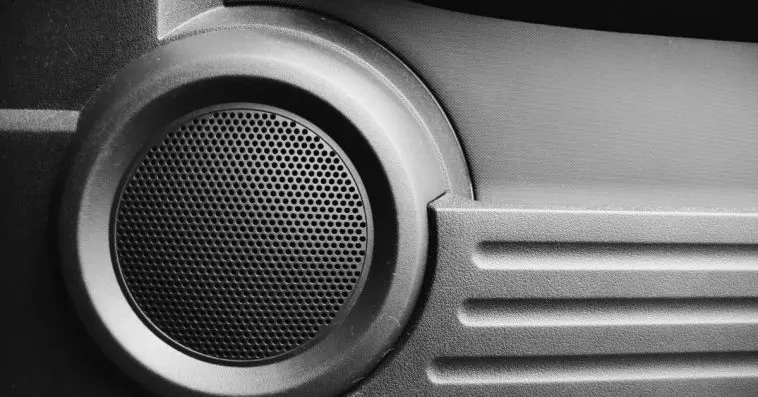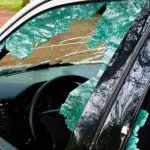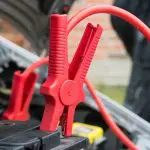There’s nothing more freaky than hearing your speakers making noise when car is off.
Did you know that even though rare it is not unheard of to hear a static hissing sound or ticks and pops? So, I set out to find the origin of the noise and get rid of it.
The noises coming from your speaker may sound like white noise, static noise(hissing), popping, etc. depending on your setup.
Here are the potential reasons for the noise coming from your speakers.
- Your stereo may be receiving power even when switched off
- Problems with electrical interference
- Issues with grounding
- Low-quality speaker wiring
- Noise from the engine
- New amplifier
- Patch cables picking up noise
- Radiated static noise
The issue with isolating the source is that any component that creates an electrical field from the windshield wiper motor to even the speaker wires may be the culprit in this case.
The key is in identifying where the noise is coming from, which is not an easy task. Unless you are a professional and have know-how on tinkering with the wiring, you might not want to try this yourself.
TABLE OF CONTENTS
Troubleshoot Your Speaker: What’s The Noise?
1. Stereo Receiving Power Even When Switched Off
Some vehicles are designed with the radio and speaker system having constant access to power at all times.
In this case, your speaker might make noises even when your car is off with the keys removed. This is the first thing you should check in your car.
To verify this, kill the engine and take the keys with you. Now turn on the radio or stereo system; if it works, your system is still receiving power from the battery, which may not be a bad thing at all.
But, your speaker may make random noises occasionally, so do not panic about it.
You do have a simple solution to this problem, which is to switch off the music system before you shut off the car. In most cases, this will resolve the issue for you.
2. Problems With Electrical Interference
Another common issue for the car speakers making static noise is due to electrical interference.
In layman’s terms, anything that transmits a signal can cause mysterious noises in your speaker system. And your car is packed with them; identifying what interferes with your stereo is a big task.
It could be as simple as that of something plugged into your USB socket or even electrical devices lying in proximity to your stereo that causes interference.
This issue is common with stereo systems fitted with aftermarket amplifiers.
Furthermore, a point to note is that the RCA cables connecting the amp to the head unit should be at a distance away from the power wire, a mistake often done by novice installers.
3. Issues With Grounding
Experts attribute the car speaker buzzing when off to a stereo system that is poorly grounded.
Every part of your stereo system including the amplifier, equalizer, head unit, and other accessories should be grounded. An improperly grounded unit can emit a significant amount of static noise.
However, this causes issues only when the stereo is off; and very rarely when it is working.
Coming to grounding, it involves pulling a wire from the component and attaching it to a metal bolt, and connecting it to the frame of the car.
Ensure that the ground wire is thick, short, and the surface it is attached to is bare and unpainted.
If the static noise is excessive, consider changing the wire to a thicker one, at least as thick as the power wire.
4. Low-Quality Speaker Wiring
Your speaker wiring may also be the culprit for the noise that you hear in your stereo system.
As with every electrical component your radio or music system is attached to the speaker via a series of wires.
If any of these wires are damaged or even if they are of poor quality, you can hear noises even after the engine is killed off.
To examine this, turn off the car and disconnect the speaker from the amplifier.
In case the noise persists, it is from the speaker wires. You have three options from here: Change the wiring, shift them, or wrap them in mu-metal foil.
5. Noise From The Engine
If none of the above work, the electrical system is to blame for the electrical noise when car is off.
Start with refilling your battery acid and wait for the sound to go off. If not, you might want to get your mechanic to check your alternator.
In the case of older cars that badly need a tuneup, you can hear a ticking sound radiated from the ignition. But this sound increases and decreases with the acceleration.
You might want to fix the ignition noise with carbon-core spark plug wires, resistor-type spark plugs, coil, and distributor caps.
If the issue still exists, you might want to test the grounding for your ignition system. If it is not grounded properly, it is radiating the ticks to the other components under the hood.
Grounding the culprit will get rid of the noise, but it is a trial and error until you do not get the noise on your car speaker.
Once you identify the offender, use a braided ground strap to ground it permanently.
Or you can go for the Big 3 Upgrade where you augment the ground wires of the chassis and battery with large gauge wires to connect those with the alternator.
This gives a better current flow or a consistent voltage and reduces the static noise or alternator whine.
6. New Amplifier
In case you have recently installed a stunningly new amplifier, it might be the culprit if your sudden car speakers pop when turned off.
It may be any reason, from being poorly mounted, bad amp, or even improperly grounded.
Install a rubber foot or grommet and isolate the amplifier from the chassis of the car. Also, ensure it is grounded securely. If it doesn’t work, you might want to replace the amplifier.
7. Patch Cables Picking Up Noise
The RCA cables that connect the audio components can pick up static noises, which are then heard in the speakers.
This happens when the patch cables are worn out or of cheap quality. Inexpensive ones do not have proper insulation or conductivity compared to those of high quality.
Disconnect the cables from the amplifier and attach a new one of good quality to the input jacks.
If you do not hear the noise, connect the old patch cables to the amp and remove them from the receiver. If the noise persists, the patch cables are to blame, and you need to replace them.
8. Radiated Static Noise
Your antenna can also cause static noise in the speaker since they can act as ground as well. Thereby, a receiver can work even when it is not properly grounded.
To verify this, unplug the antenna; if the sound goes away, you might want to install a noise suppressor for the antenna in addition to grounding both securely.
When the above doesn’t work, pull the receiver from the dash and check if the noise still persists.
If the noise stops, it is due to the receiver being close to a device that makes electrical noises. Installing a noise filter helps to minimize the noise.
You can also try moving the receiver’s wiring to avoid radiated noise. Another option is to use a mu-metal foil to shield the back of the receiver, the wires, or the component that’s radiating the noise.
Prevent The Car Speaker From Making Noise
As mentioned above, there are quite a lot of reasons why the car speaker makes noises even when it is turned off.
So, the first step in fixing is to track and pinpoint the source or sources of the static noise.
It can be with the stereo or amplifier or with the accessories like a radio, CD player, or even the iPhone charging on the USB socket.
In most cases, resetting the ground and securing it again with a thick wire does the magic. But if the issue persists, you might want to start by turning on the head unit to locating the origin of the noise.
If the noise is present only when the car is turned on and changes with the RPM, it might be due to the alternator. This kind-of whining noise is fixed by installing a noise filter.
Radio Static
If the noise exists only when the musical source is radio, it might be due to the antenna or an interference. Move ahead with the next steps only if you are comfortable working on your car.
- Monitor for outside electrical influences.
- Check of the ground is proper and secure. The cable should be as thick as the power cable and just 18” long.
- Disconnect the antenna and check for the noise. If the noise ceases, then the antenna is the reason for the static.
- Move the antenna wire so that it doesn’t come in contact with any devices that causes the static.
- As the last attempt, remove the head unit and rearrange the wires that they aren’t in contact or close to any other wires or devices that cause an interference.
- If none of these work, a noise filter is your only chance.
Fix The Other Sources Of Noise
If the source of the problem is an auxiliary device such as your phone or CD player, then the issue might be due to a ground loop.
Once you locate the source and fix it by adding a ground loop noise isolator, you should be able to get rid of the noise.
You may also want to check the previous section and rule out the RCA cables. Make sure that no part of the amplifier touches the metal.
If they do touch, hoist it on a rubber frame. In case the static still persists, your amplifier is to blame.
FAQs
Q1. How Do I Stop My Engine From Making Noises Through Speakers?
The quick way to stop your engine from making noises through the speakers is to install an inline noise suppressor or a ground loop isolator.
Not only are they easy to use, but they also do not cost much at all. My pick is the AUKEY Ground Loop Noise Isolator which filters out all the unnecessary noise from your car speaker.
Q2. Why Do My Speakers Pop When I Turn My Car Off?
The pop sound you hear in the car speakers or the amplifiers is due to them turning off and on. The causes are bad grounding or a poor quality amplifier.
When turning on, it faces a rush of current first when it powers on, and then again when your choice of the musical source is selected. This rush causes the speaker to pop.
The reverse happens when the stereo is powered off. In both these cases, the amplifier in itself can also be the reason for the pop on the speakers.
Q3. Why Is My Car Speaker Making A Buzzing Noise?
Speakers in any vehicle produce a buzzing noise otherwise called vibration when music is played. However, it should not be noticeable.
If you are hearing it well above the music, there are chances that the membrane is damaged. When the membrane tears or develops a hole, it vibrates hard, creating a buzzing noise.
Conclusion
While it is not common, your car speakers can make sounds occasionally and even when the engine is turned off.
This is due to many reasons, including signal interference, improper grounding, low-quality speaker wires, etc. While it is not as big an issue as when the car is running, it is definitely annoying.
The issue you face with resolving the static noise is due to the many electrical and electronic components, which can cause interferences due to improper grounding.
While this article acts as a guide for you, do not attempt to resolve this, unless you possess the knowledge to tinker with the electrical system of the car.





